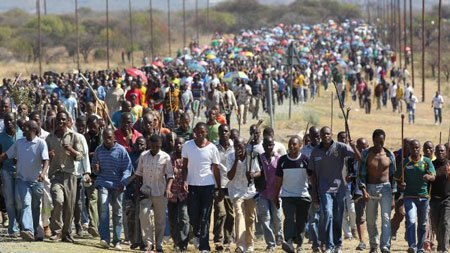
JOHANNESBURG — Shell said it could not honour fuel delivery contracts around Johannesburg because of a two-week truckers’ strike and police shot dead a striking miner, taking the death toll in two months of South African labour unrest to 48.
Report by Reuters
The rand fell 2% to within sight of a three-year low against the dollar as investors pulled back from Africa’s biggest economy amid fears the ruling African National Congress (ANC) is powerless to manage the spreading labour unrest.
President Jacob Zuma has been criticised for his low-key response to the most damaging bout of industrial action since the end of apartheid, especially after police killed 34 strikers at Lonmin’s Marikana platinum mine on August 16.
In a speech to business leaders late on Thursday, he put a positive spin on the situation, stressing that since the end of white-minority rule, South Africans have shown “the capacity to overcome difficulties when we work together”.
“We should not seek to portray ourselves as a nation that is perpetually fighting,” he said.
However, with an ANC leadership run-off looming in December, Nelson Mandela’s 100-year-old liberation movement is pre-occupied with its own divisions and Zuma is unlikely to take any action to stabilise the economy that could upset his political allies in the unions.
“In the build-up to the election, the government is unlikely to come out with any clear policy directives,” said Simon Freemantle, an analyst at Standard Bank in Johannesburg.
- Chamisa under fire over US$120K donation
- Mavhunga puts DeMbare into Chibuku quarterfinals
- Pension funds bet on Cabora Bassa oilfields
- Councils defy govt fire tender directive
Keep Reading
Reflecting such concerns, Moody’s cut South Africa’s credit rating last week, and the intensifying strikes in the mining sector and elsewhere are raising very real fears of a big hit to already sluggish economic growth for this year.
Finance minister, Pravi Gordhan, has already said he will have to cut his 2,7% growth forecast for 2012 when he delivers an interim budget on October 24.
More than 75 000 miners, or 15% of the workforce in a sector that accounts for 6% of output, are out on unofficial strikes and tensions with security forces and mining bosses are running high.
Near the “platinum belt” city of Rustenburg, 120km northwest of Johannesburg, workers said a miner was killed by a rubber bullet fired by police overnight.
“He was shot here by the police,” Mbubhu Lolo, a striker from Anglo American Platinum (Amplats) said, pointing to his midriff.
Police would not confirm the cause of the death, although the ground nearby was strewn with spent rubber-bullet shell casings and teargas canisters after clashes involving water cannon the previous evening.
On Friday, protesters in a shanty town near the Amplats mine barricaded streets with rocks and burning tyres, watched by a contingent of more than 30 riot police backed by armoured vehicles.
Earlier in the week, strikers torched an Amplats training centre and two conveyor belts, making it harder for the world’s biggest platinum producer to restart operations when it does manage to resolve what is already a three-week standoff.
AngloGold Ashanti, South Africa’s biggest bullion producer, has lost virtually all local production due to wildcat strikes, while rivals Gold Fields and Harmony Gold have also taken a hit.
Around 300 strikers at Kumba Iron Ore have also blockaded the company’s giant Sishen iron ore mine in the remote Northern Cape province.
Mine unrests shake investor confidence The mining sector unrest has shaken investor confidence, and signs of it spreading into manufacturing — which accounts for 15% of output — and an expanding truckers’ strike have caused even more alarm.
“There is fuel available across the country, so the issue is not fuel supply, but the challenge is delivering it safely to our retail sites,” oil giant Shell said after invoking a “force majeure” clause that allows it to break contracts due to situations beyond its control.
Other petrol companies are holding their breath, especially around the commercial hub Johannesburg, but have not yet followed Shell’s move.
Raising the stakes in its two-week stoppage by 20 000 truckers, the Satawu transport union said it wanted co-workers on South Africa’s railways and ports to strike next week, a development that would affect coal and other mineral shipments.











